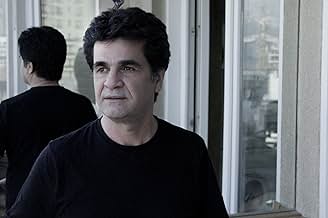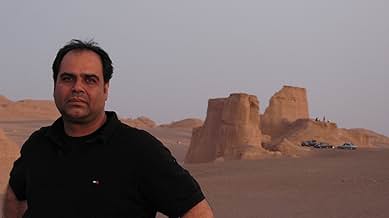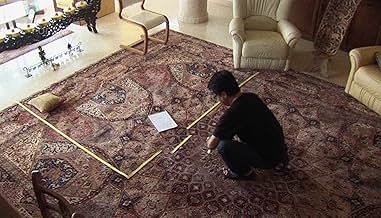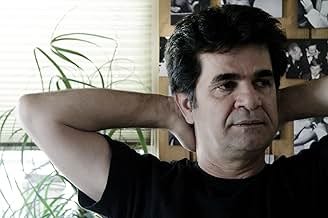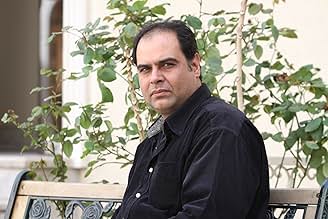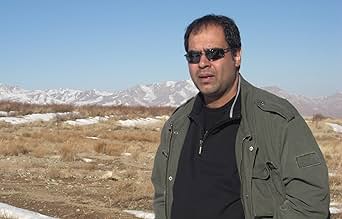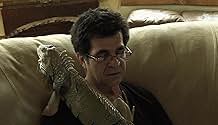IMDb RATING
7.4/10
5.9K
YOUR RATING
It's been months since Jafar Panahi, stuck in jail, has been awaiting a verdict by the appeals court. By depicting a day in his life, Panahi and Mojtaba Mirtahmasb try to portray the depriva... Read allIt's been months since Jafar Panahi, stuck in jail, has been awaiting a verdict by the appeals court. By depicting a day in his life, Panahi and Mojtaba Mirtahmasb try to portray the deprivations looming in contemporary Iranian cinema.It's been months since Jafar Panahi, stuck in jail, has been awaiting a verdict by the appeals court. By depicting a day in his life, Panahi and Mojtaba Mirtahmasb try to portray the deprivations looming in contemporary Iranian cinema.
- Awards
- 10 wins & 14 nominations total
- Directors
- Writer
- All cast & crew
- Production, box office & more at IMDbPro
Featured reviews
This is not a film and also not a documentary in a proper sense. This is a Video recording of two persons. But the good part is that within the few minutes you will understand why this film had to be made. A person cannot stop his talent for longer. This is happening with Jafar Panahi, the Iranian director who is fighting with his government. He has to stay inside his house without making films and he might go to jail. In the middle you might feel a little bored because of no change in location but eventually you will understand his limitations and the desperation which caused him to make this.
PROS: The film is slow but to some extend you will want to forgive for everything. He tries to make the documentary interesting by telling some of his previous films experiences and those are really amazing. His pet will keep you alive all the time. In few words, I would say that this is one of the best documentaries.
CONS: Got a little bored in the middle.
Message: "Don't stop because of obstructions." Verdict: "A must watch documentary."
PROS: The film is slow but to some extend you will want to forgive for everything. He tries to make the documentary interesting by telling some of his previous films experiences and those are really amazing. His pet will keep you alive all the time. In few words, I would say that this is one of the best documentaries.
CONS: Got a little bored in the middle.
Message: "Don't stop because of obstructions." Verdict: "A must watch documentary."
Hidden inside a birthday cake and smuggled out of the country, the 75-minute "effort", This is Not a Film, tells us all we need to know about the cruelty of the Iranian dictatorship and the courage of film director Jafar Panahi. Panahi, who has given the world such masterpieces as The White Balloon, The Circle, and Crimson Gold was arrested in March, 2010 and faces a ban of twenty years from making films and a six-year prison sentence for "propaganda against the Islamic Republic." This refers to exercising free speech by speaking out against the rigged elected of Iranian President Mahmoud Ahmadinejad.
As part of his sentence, Panahi is barred from making films or writing screenplays, is unable to speak in his behalf, and forbidden to leave the country. While awaiting the results of his appeal, Panahi is filmed in his home by fellow director Mojtaba Mirtahmasb using a digital video camera and a cell phone. What begins as an innocuous home movie with Panahi sitting at his table eating breakfast takes on an added dimension when he calls Mirtahmasb, asking him to come by to discuss some ideas, but cautions him not to tell anyone about his visit.
While waiting for his friend to arrive, he talks on the phone with his lawyer who tells him that the court may waive the 20-year ban on filmmaking but are not likely to reduce his jail sentence. When Mirtahmasb arrives, Panahi reads from his latest screenplay which was rejected by the censors. Acting out the story, he puts tape around the area to suggest the apartment in which the story occurs. As he begins to read the screenplay about a young woman forbidden by her parents to attend university, tears come to his eyes and he stops, saying poignantly,
"If we could tell a film, then why make a film?" and expresses his regret about the harshness of the penalty he faces. Soon he takes care of his pet Iguana, Igi, and cares for a neighbor's dog who doesn't know the value of silence. As fireworks explode on the streets to celebrate the Persian New Year, a college student arrives to collect the trash as a substitute for the custodian, and the two engage in a dialogue, remembering the day when Panahi was arrested. To bring home the point even more forcefully, Panahi watches as a TV newscaster proclaims that fireworks are illegal. What started out as a home movie at the end becomes an act of non-violent protest.
As part of his sentence, Panahi is barred from making films or writing screenplays, is unable to speak in his behalf, and forbidden to leave the country. While awaiting the results of his appeal, Panahi is filmed in his home by fellow director Mojtaba Mirtahmasb using a digital video camera and a cell phone. What begins as an innocuous home movie with Panahi sitting at his table eating breakfast takes on an added dimension when he calls Mirtahmasb, asking him to come by to discuss some ideas, but cautions him not to tell anyone about his visit.
While waiting for his friend to arrive, he talks on the phone with his lawyer who tells him that the court may waive the 20-year ban on filmmaking but are not likely to reduce his jail sentence. When Mirtahmasb arrives, Panahi reads from his latest screenplay which was rejected by the censors. Acting out the story, he puts tape around the area to suggest the apartment in which the story occurs. As he begins to read the screenplay about a young woman forbidden by her parents to attend university, tears come to his eyes and he stops, saying poignantly,
"If we could tell a film, then why make a film?" and expresses his regret about the harshness of the penalty he faces. Soon he takes care of his pet Iguana, Igi, and cares for a neighbor's dog who doesn't know the value of silence. As fireworks explode on the streets to celebrate the Persian New Year, a college student arrives to collect the trash as a substitute for the custodian, and the two engage in a dialogue, remembering the day when Panahi was arrested. To bring home the point even more forcefully, Panahi watches as a TV newscaster proclaims that fireworks are illegal. What started out as a home movie at the end becomes an act of non-violent protest.
A late addition to the Cannes 2011 programme after being smuggled into France inside a cake, Iranian director Jafar Panahi's "This is Not a Film" (2011) is by no means your average political documentary. The 75-minute piece, shot partially on an iPhone, captures the day-to-day life of Panahi during a state-imposed house arrest in his Tehran apartment as he appeals a six year prison sentence and 20 year filmmaking ban for his opposition to the 2011 Iranian elections.
Here in the Western world, our access to information, democratic governments, and human rights are taken for granted. Panahi and Mirtahmasb are putting their lives on the line to tell the stories they feel they must tell, in the hope that, one day, their nation will be able to have the same sort of pro-democratic freedom as the rest of us. Gripping entertainment. Little by little "This Is Not a Film" leads to a final scene of overwhelming power. Anyone interested in cinema and/or Iran owes it to themselves to become familiar with this "not" film.
Here in the Western world, our access to information, democratic governments, and human rights are taken for granted. Panahi and Mirtahmasb are putting their lives on the line to tell the stories they feel they must tell, in the hope that, one day, their nation will be able to have the same sort of pro-democratic freedom as the rest of us. Gripping entertainment. Little by little "This Is Not a Film" leads to a final scene of overwhelming power. Anyone interested in cinema and/or Iran owes it to themselves to become familiar with this "not" film.
I saw this film (or not film, if you want..) at the CPH DOX festival yesterday and was spellbound by it. All reviews I have read, have focused on the political circumstances, and the fact that director Jafar Panahi has been blacklisted and sentenced by the Iranian government. I think many of these reviews focus too little on the beauty, warmth and wonderfully subtle message of this film, or the fresh and uplifting honesty and awareness of its cinematic language. To me the most important and moving aspects of this film, is found in the beauty of its atmosphere. In Panahis search for truth and honesty. In its daring and courageous will to let circumstances and coincidence be the writer and director. In its warm, original and surprisingly humorous form. The way the film evolves trough coincidence and the power of circumstance, it itself becomes a beautiful image of Mr. Panahis situation, and by doing that, it becomes a reflection on any persons situation, a reflection on existence itself. Dealing with society, suppression, creativity, filmmaking, human interaction, kindness and honesty I would find it difficult to explain what the film is actually about. Most of all its much more a poetic journey, than a political statement. If it is a statement its a statement of the humane. I understand why some will be bored watching this small, slow, quiet film. Any viewer will have to put himself in a state of slow enjoyment to really benefit from it. But it is absolutely worth it. To me one of the great achievements Mirtahmasb and Panahi makes here, is the fact that they made me feel, think and reflect more by watching two guys filming each other, than any million budget Hollywood movie has ever done. The self aware style of this film worked like a wake up call for me, making it so much stronger.
If you can relate to topics like: filmmaking, art, inspiration or problems connected to being a living being in the world, I highly recommend this. My best wishes for Mr. Panahi, and congratulations with the achievement.
If you can relate to topics like: filmmaking, art, inspiration or problems connected to being a living being in the world, I highly recommend this. My best wishes for Mr. Panahi, and congratulations with the achievement.
Iranian director Jafar Panahi is one of world's most important movie makers nowadays, while also a victim of the oppressive regime in his country. Arrested, together with other artists, during the events following the Iranian presidential elections in 2009, he spent several months in prison. He was freed then on bail while the judicial procedure against him was going on. Mr. Panahi was eventually sentenced to 6 years of prison and 20 years ban to make movies.
It was during the period spent at home in 2010 that Jafar Panahi made this movie, with the title This is Not a Film (In Film Nist). A friend, documentary producer Mojtaba Mirtahmasb (the author of Lady of the Roses, 2008), came with a consumer-grade camera and shot the footage for a 75 minutes video, having Mr. Panahi as co-director, screenwriter, film editor and star. The video was eventually smuggled outside Iran on a flash drive and screened at the 2011 Cannes Festival.
It's just that: 75 minutes in a day spent by Jafar Panahi at home, waiting for the result of the trial. He talks to the phone with his lawyer, then feeds his pet (who is a very nice iguana), then talks with the cameraman shooting the footage about a project for a new film, rejected by the censorship, memories from some of his movies come and go, suddenly a terrible noise of explosions is heard - it's nothing than fireworks, and Mr. Panahi goes to the window to shoot them with his cell phone.
A movie that is not a movie, says Mr. Panahi. It's just mundane reality. Well, it's not that simple: this movie is a non-movie while this non-movie is a movie. Because it's his reality, his universe, which is sending us to the universe of his movies. All his movies talk actually about him, about his universe, and it becomes obvious here, in this non-movie which carries all the tension between image and reality - reality sublimated in cinematic image. Like Mozart, this moviemaker thinks only in artistic constructions. For Mozart any fact of life was musical sound, musical rhythm, for Panahi every fact of life is cinematic image, cinematic rhythm. Look, even his concerns for the sentence to come become art! However, the strongest association should be made to Beethoven! This moviemaker carries all the tension between reality and art, all his creation is fully aware of the paradoxical relationship between reality and art: reality mirrored in art, art mirrored in reality, art suffering that reality struggles to keep its autonomy, reality suffering that it is taken for art.
It was during the period spent at home in 2010 that Jafar Panahi made this movie, with the title This is Not a Film (In Film Nist). A friend, documentary producer Mojtaba Mirtahmasb (the author of Lady of the Roses, 2008), came with a consumer-grade camera and shot the footage for a 75 minutes video, having Mr. Panahi as co-director, screenwriter, film editor and star. The video was eventually smuggled outside Iran on a flash drive and screened at the 2011 Cannes Festival.
It's just that: 75 minutes in a day spent by Jafar Panahi at home, waiting for the result of the trial. He talks to the phone with his lawyer, then feeds his pet (who is a very nice iguana), then talks with the cameraman shooting the footage about a project for a new film, rejected by the censorship, memories from some of his movies come and go, suddenly a terrible noise of explosions is heard - it's nothing than fireworks, and Mr. Panahi goes to the window to shoot them with his cell phone.
A movie that is not a movie, says Mr. Panahi. It's just mundane reality. Well, it's not that simple: this movie is a non-movie while this non-movie is a movie. Because it's his reality, his universe, which is sending us to the universe of his movies. All his movies talk actually about him, about his universe, and it becomes obvious here, in this non-movie which carries all the tension between image and reality - reality sublimated in cinematic image. Like Mozart, this moviemaker thinks only in artistic constructions. For Mozart any fact of life was musical sound, musical rhythm, for Panahi every fact of life is cinematic image, cinematic rhythm. Look, even his concerns for the sentence to come become art! However, the strongest association should be made to Beethoven! This moviemaker carries all the tension between reality and art, all his creation is fully aware of the paradoxical relationship between reality and art: reality mirrored in art, art mirrored in reality, art suffering that reality struggles to keep its autonomy, reality suffering that it is taken for art.
Did you know
- TriviaDirector Jafar Panahi was put under house arrest in 2010 and banned from filmmaking for 20 years. This film was smuggled out of Iran on a USB stick hidden in a cake.
- Quotes
Mojtaba Mirtahmasb: It's important that the cameras are ON.
- How long is This Is Not a Film?Powered by Alexa
Details
- Release date
- Country of origin
- Official sites
- Language
- Also known as
- Esto no es una película
- Filming locations
- Production company
- See more company credits at IMDbPro
Box office
- Gross US & Canada
- $77,016
- Opening weekend US & Canada
- $12,608
- Mar 4, 2012
- Gross worldwide
- $88,758
- Runtime
- 1h 15m(75 min)
- Color
Contribute to this page
Suggest an edit or add missing content


